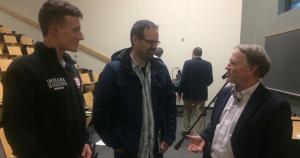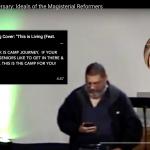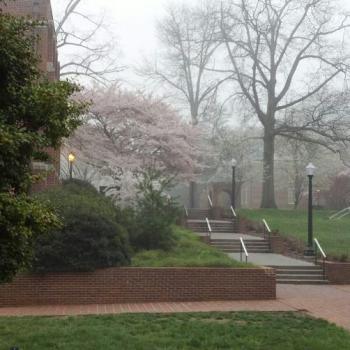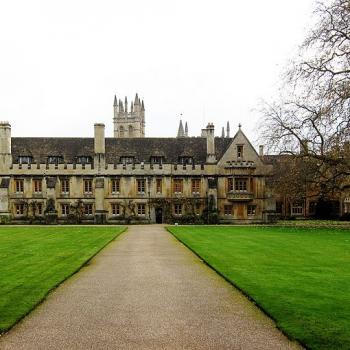On April 10, 2017, I strolled into a large venue with my two older sons Mateo and Cruz. Before even seeing that there were between 250 – 300 people getting seated, we were met with loud chatter. There were various refreshments. I enjoyed a good cup of coffee and we settled in for the talk, with my tablet ready for notes.
My family had discovered that Ratio Christi Ministries, in cooperation with Northwestern Michigan College, was hosting a talk by Dr. Thomas Woodward. Dr. Woodward studied history at Princeton, holds a Th.M. from Dallas Theological Seminary, has a Ph.D. in the Rhetoric of Science from the University of South Florida, and is a historian of the theory of Intelligent Design.
Dr. Thomas Woodward is also the President of the C.S. Lewis Society. The session that night was on “C.S. Lewis and the God Hypothesis.”[1]
“You could probably tell this story better than me!”
As the presentation began, Tony Feiger of Ratio Christi made the introductions, stating that Dr. Woodward would share first. Then there would be a microphone for questions afterwards.
Dr. Woodward began to lecture and to engage his large audience with the history of Lewis and stories of Narnia. He asked questions, fielded answers, and masterfully captivated the crowd of primarily collegians. I was quite surprised.
On a couple occasions, when someone answered correctly, Dr. Woodward would teasingly reply, “Oh, you could probably tell this story better than me!” This is the answer I received from him when I had the correct answer for the man who played the role of C.S. Lewis in the movie Shadowlands (1999).
 JVI, in conversation with Dr. Thomas Woodward
JVI, in conversation with Dr. Thomas Woodward
Ratio Christi & NMC | 04.10.17
Do you know who that actor was? You’ve probably heard of him.
One caveat about that movie from someone who has sat at the desk of C.S. Lewis. The suffering of C.S. Lewis, as portrayed in Shadowlands, precedes that season in his life. It stems from his earlier days in the Great War, a point to which Dr. Woodward offered some insight.
The story of my interest in Lewis and Tolkien
My dad has read all of the Narnia books to my siblings and I, complete with theatrical voices, since we were children, and long before any movies (including B.B.C. productions). He has now carried on this tradition with his grandchildren.
I’ve worked through the books with our oldest son. Our middle son has heard everything through The Silver Chair. Our youngest is already looking forward to the readings. I’ve also read The Hobbit on a couple occasions to our two older sons, especially as we waited for the film series. My dad and I have also read the The Silmarillion.
Our interest may be nothing extraordinary for fans of Lewis or John Ronald Reuel Tolkien (J.R.R. Tolkien). One college student, who gave me my first couple of Tolkien books, along with some books on writing, had read through the Lord of the Rings trilogy every year since he was a child.
I had heard of the connection between Lewis and Tolkien and spoken with avid readers who knew parts of their stories. I once discovered a book in Ashland, Kentucky, The Letters of J.R.R. Tolkien. Since it was in a private library, I had to make a quick decision as to what letters I would read, because I tentatively had 3-5 days there.
I jotted down notes and citations, some used later in papers and sermons, on every letter I could between Tolkien and Lewis, who was apparently one of his close friends. Dr. Woodward sheds some light on their relationship.
Aslan Acrostic
It may be a little known fact that C.S. Lewis was, for quite some time, an atheist. Dr. Woodward shared an Aslan Acrostic as a basis for his narrative.
- C.S. Lewis is an Atheist from the ages of 9-20.
- He becomes a Seeker.
- He’s a Literary Genius as a follower of Christ, in English Literature and many other genres, including science fiction.
- Then he becomes an Apostle, moving out to engage the world with writings like The Screwtape Letters, The Problem of Pain, etc.
- Finally, Lewis becomes a Narnian.
A – theist
S – eeker
L – iterary Genius
A – postle
N – arnian
Athiest
C.S. Lewis has a troubled childhood. His mom dies of cancer. He has a distant father and a terrible prep school. He does have one bright spot in high school – a mentor who houses and tutors him – like an amazing home school.
Lewis serves in World War I and is badly injured. Afterwards, he is admitted into Oxford. He experiences a growing pessimism:
“I did not believe God existed, and I was angry at him for not existing . . .”
Seeker
There are two experiences of transcendent joy that Lewis has as a child and growing up, that he describes as almost painful joy. This joy seems to be just out of his reach. He believes these joy moments point to a God. These are found in his autobiography, Surprised by Joy: The Shape of My Early Life.
As a teacher at Oxford, Lewis remains an atheist, however the tide begins to turn. Another colleague, an atheist historian drops in to Lewis’s office one day and talks to him about the Gospels.
As a historian, the atheist begins to share with Lewis that the history of the Gospels is actually very good history
When discussing the resurrection, he states that something could have actually happened. It may have not been just another historic, cultural myth.
Lewis seems to be shaken somewhat by this conversation. Are the Gospels possibly actual history? Could a resurrection have literally happened once in reality, not only in mythology? Another atheist had sat down in his office and argued in favor of the Gospels.
Later, Lewis says that he was basically dragged “kicking and screaming” to the altar.
The crux of the dialogues: Lewis and Tolkien, 1931
Lewis’ office still stands at Oxford. I believe Dr. Woodward said that people still feed deer out of their hand near the woods behind the building, as they did in Lewis’ day. As you walk out of the front of the doors and take and left, you head toward Addison’s Walk at Oxford.
On Addison’s Walk, Lewis and Tolkien discuss the great questions that Lewis is grappling with. It is a clear night with a starry sky.
Some may not realize it, but Tolkien is what we now call a philologist, understanding ancient languages, and unlocking keys to histories, myths, etc. He certainly shows unique abilities and skills to create languages in his writings.
So Lewis seems stuck on Addison Walk, in between history and mythology. Tolkien basically asks Lewis a simple question.
“Could it possibly be that the line of mythology and history intersect at this one point?”
In effect, Tolkien asks, is the Christ event the crux of mythology and history?
Did the trajectories of mythologies and histories ever connect?
Lewis goes home, prays, and chooses to believe in Jesus that night!
The impact of their friendship
Since some people that I have talked to are so interested in the relationship of Tolkien and Lewis, I’ll offer one example of the impact of their friendship on society.
In the early 1940’s, citizens begin to press for more legal freedom to divorce in England. Some see this as a sign of the times, the unraveling of society.
Although some press for freedom to divorce, others, including the church, stand opposed. Tolkien and Lewis turn their gaze to the issue at hand. In a letter in 1943, Tolkien write to Lewis:
“The battle may be a losing one, but I cannot help suspecting that those who fight against the divorce in this case of law and religion are in the right. Sentire cum ecclesia: how often one finds that this is a true guide.”[2]
In Latin, sentire cum ecclesia basically means to hold an opinion, or to side with the church.
What do Tolkien and Lewis think? First of all, they side with the ecclesia (and may I add, historic Scriptural interpretation and tradition of the church, not modern trends of their age). The courts of England are allowing far more than what God intends, and who can argue with Lewis or Tolkien on Theology or language interpretation?!
Secondly, Tolkien upholds the ecclesia’s right to speak to the issue!
First, we can learn from this brief vignette of Tolkien and Lewis, who rally support for proper Biblical understanding, that Christians can depend on God’s Word for answers to ethical questions.
Secondly, we have a right (or rite) to speak to these issues. Having a Biblical understanding about ethics is one thing. Taking a stand is another!
Literary Genius
One of the books that Dr. Woodward says that he loves is Perelandra. Since that time my oldest son has read the Space Trilogy, which includes Perelandra; he thoroughly enjoyed the series.
For those who like audio books, The Four Loves is still available. I believe it’s the only audio book read by Lewis himself. He explores the four classic Greek words for love.
Apostle
In 1947, C.S. Lewis makes the cover of Time, three years before the Chronicles of Narnia. He’s called a heretic by Time because of his apostolic writings on classic Christianity. He writes The Screwtape Letters (another book my family enjoyed) and The Problem of Pain.
At times, Dr. Woodward explores these topics in depth on the site Apologetics.org – C.S. Lewis Society.
About the book Mere Christianity, Dr. Woodward addressed the question:
“What are we to make of Jesus Christ?”
Lewis never meets G.K. Chesterton, but reads his works extensively. Chesterton declares that Jesus Christ is the Lord, or a lunatic, or a liar!
What do we think of His claims? They’re either true or false.
If the claims of Christ are true . . . then He is Lord.
If they’re false . . . He knew . . . and was therefore a liar.
If they’re false . . . and He didn’t know . . . then He was a lunatic.
If Jesus Christ is Lord, even if it’s a possibility, then that should lead us to consider His claims.
Dr. Woodward says that C.S. Lewis adapts Chesterton’s line of rationale in Mere Christianity: Book 2, What Christians Believe (and I believe in God in the Dock as well). It is Lewis’ most famous argument.
In my seminary experience, Mere Christianity is highly regarded, not only Theologically but also philosophically. Lewis has an uncanny ability to speak to various streams of Theology. However, he is doing apologetics, offering a philosophical approach for our belief in God that builds up to our Christian way of life.
Narnian
C.S. Lewis starts “The Kilns,” a home where he welcomes children suffering after World War II. He begins developing the idea of Narnia from this time with those children and his wife, Joy.
Eventually, C.S. Lewis shifts to Cambridge University.
Lewis tours are offered by Christian Heritage: London. At times Dr. Thomas Woodward still participates in the London, Oxford & Cambridge national tour, which includes a stroll on Addison Walk.
[1] adapted from conversation and the teaching of Thomas Woodward, “C.S. Lewis & the God Hypothesis” (presentation, Ratio Christi Campus Apologetics Alliance: Northwestern Michigan College Chapter, Traverse City, MI, April 10, 2017). [2] J.R.R. Tolkien, The Letters of J.R.R. Tolkien, ed. Humphrey Carpenter and Christopher Tolkien (Boston, MA: Houghton Mifflin, 2000), 62.
Amazon: The Letters of JRR Tolkien













